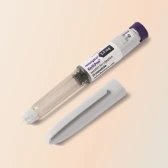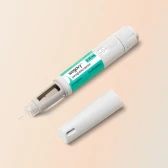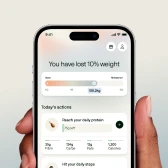Ozempic isn’t necessarily known for its effects on the mouth. After all, like Mounjaro and Saxenda weight loss injections, you insert it into the fatty tissue under your skin.
Yet some people taking it have reported “Ozempic mouth”, a blanket term for various oral symptoms like dry mouth or changes in how the skin around the mouth looks.
Ozempic mouth isn’t a medical term. Rather, it’s something that’s come up online as people have shared their experiences on weight loss medication. Here’s what you need to know about it.
FYI: Ozempic is another name for Wegovy—both are brand names for the active ingredient semaglutide. Ozempic is licensed for type 2 diabetes (though it’s sometimes used off-label for weight loss), while Wegovy is licensed for weight loss.
What causes Ozempic mouth?
That depends on what you mean by “Ozempic mouth”.
Often, this refers to changes in how the skin around the mouth looks after you’ve lost weight. Namely: your skin might sit a bit looser, giving you a more gaunt appearance (people also call this “Ozempic face”).
It’s something that might happen if you lose a lot of weight quickly. Whereas losing weight in a more gradual, sustained way may help your skin stay more taut.
Some people use “Ozempic mouth” to describe other oral symptoms, like having a dry mouth or tooth decay. Semaglutide isn’t thought to directly cause these—rather, they’re likely to be knock-on effects from other side effects of weight loss medications like Mounjaro or Wegovy, such as dehydration or nutritional deficiencies if you’re not eating enough.
Oral problems can be prevented by gradual (rather than rapid) weight loss, ensuring good water intake and a balanced diet. For example:
- Heartburn can cause a sour or bitter taste in your mouth, bad breath, and contribute to tooth decay and tooth erosion
- Some people experience vomiting and diarrhoea with weight loss medication, especially at the start of their treatment journey. If you don’t replace the fluids lost, you can become dehydrated, which can give you a dry mouth. This can also happen if you don’t drink enough fluids. Vomiting can also contribute to tooth decay.
- Burping can give you bad breath
There’s also been reports that suggest semaglutide can reduce saliva production. This would give you a dry mouth and possibly bad breath.
But in up to one in ten people, semaglutide can cause changes in how food tastes. This is thought to be because it influences which signals are sent to the brain around taste and appetite.
Symptoms of Ozempic mouth
Because Ozempic mouth isn’t a medical term, there’s no official list of its symptoms (sorry). But here are some mouth-related side effects that have been reported anecdotally by users of weight loss medication:
- Dry mouth
- Reduced thirst
- Bad taste—some people report a metallic taste
- Reduced saliva
- Tooth decay (sometimes called “Ozempic teeth”)
- “Ozempic tongue”—a term that refers to changes in how food tastes
Aside from changes in taste, these aren’t listed as official side effects of semaglutide and aren’t commonly reported.
Why some people get Ozempic mouth (and others don’t)
Everyone is different! We can all react to medicine in our own way. Besides, a bunch of other factors influence your oral health, too—including your diet, lifestyle and your oral hygiene.
Is Ozempic mouth permanent?
Most of the time, side effects from Ozempic/Wegovy weight loss injections are mild and resolve on their own.
But if your symptoms don’t clear up or get worse, do check in with your provider. We’ve also got a side effect hotline here at Voy that you can ring with any questions or concerns if you get your medication from us.
Best ways to soothe Ozempic mouth
Here are some ways to keep your mouth clean and healthy (and to keep your breath from smelling):
- Stay hydrated. Dehydration is a common cause of dry mouth and can contribute to oral disease, such as infections, mouth sores and bad breath.
- Brush your teeth at least twice per day with toothpaste that contains fluoride.
- Floss between your teeth every day.
- Avoid sugary foods.
- Use alcohol-free mouthwash.
- Stick to your oral hygiene routine.
What you eat on weight loss medication is so important, too. Some vitamin and mineral deficiencies can cause oral symptoms, in particular vitamin D, C, and calcium.
Ozempic vs Mounjaro: Which is worse for your teeth?
We can’t say: there isn’t enough scientific evidence about how either medicine affects the teeth.
Plus, the health of your pearly whites is down to much more than the medicines you take, so oral symptoms may vary from person to person anyway. For instance, your diet and whether you smoke both play a role.
When to see a doctor
Any symptoms that are getting worse or not clearing are worth checking out. Some red flags around oral health are:
- Having bad breath or a dry mouth that doesn’t go away
- Problems or pain when swallowing food or drinks
- Mouth sores
- Pain
- Redness or swelling
- A high temperature
Ozempic dry mouth can increase your risk of tooth decay or infections, so it’s definitely something you should sort sooner rather than later.
Remember: your provider is there to help. They might suggest adjusting your semaglutide dose or other supportive treatments. And don’t forget about your dentist! They can help you put together a killer oral health routine.
Side effects support at Voy
"If you're using Voy and you experience any side effects, rest assured that our expert clinicians are just a message or phone call away. They can adjust your dose, prescribe medication to ease your symptoms, or simply offer reassurance.
Everyone responds differently to weight loss treatment and we'll help you find what feels right for you."

Weight loss medication
If you are thinking of trying weight loss medication, please don’t let the above put you off. Your provider will only prescribe it to you if they feel it’s safe, and if the benefits outweigh the risks.
You can get medication posted to you each month as part of our weight loss programme. As well as Wegovy, there’s Saxenda and Mounjaro weight loss injections, plus orlistat weight loss pills—a Voy clinician will let you know which option might be most suitable for you. You’ll also get dedicated, one-to-one support from our clinicians and coaches.
Take our quiz to see if you’re eligible. It won’t take more than a few minutes.












